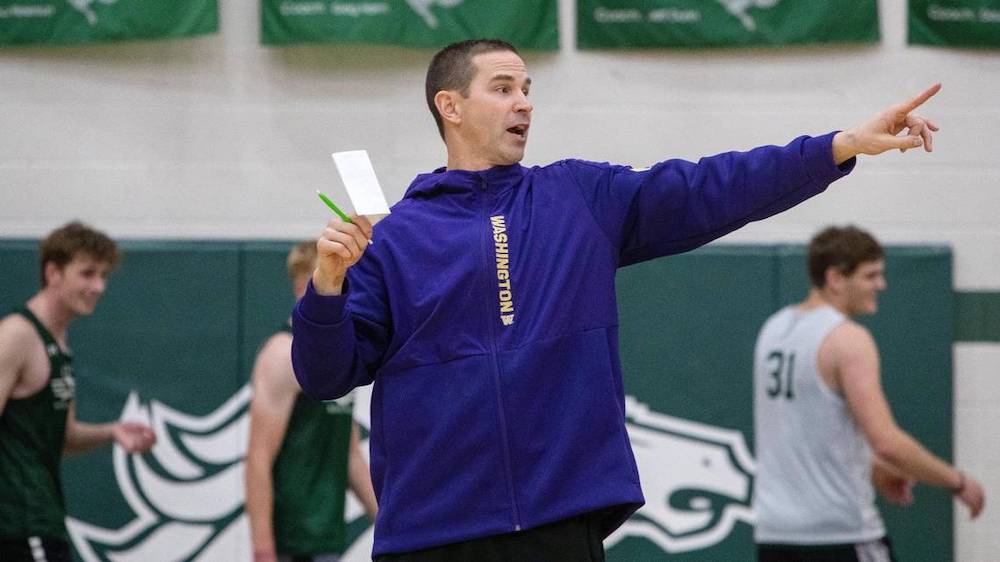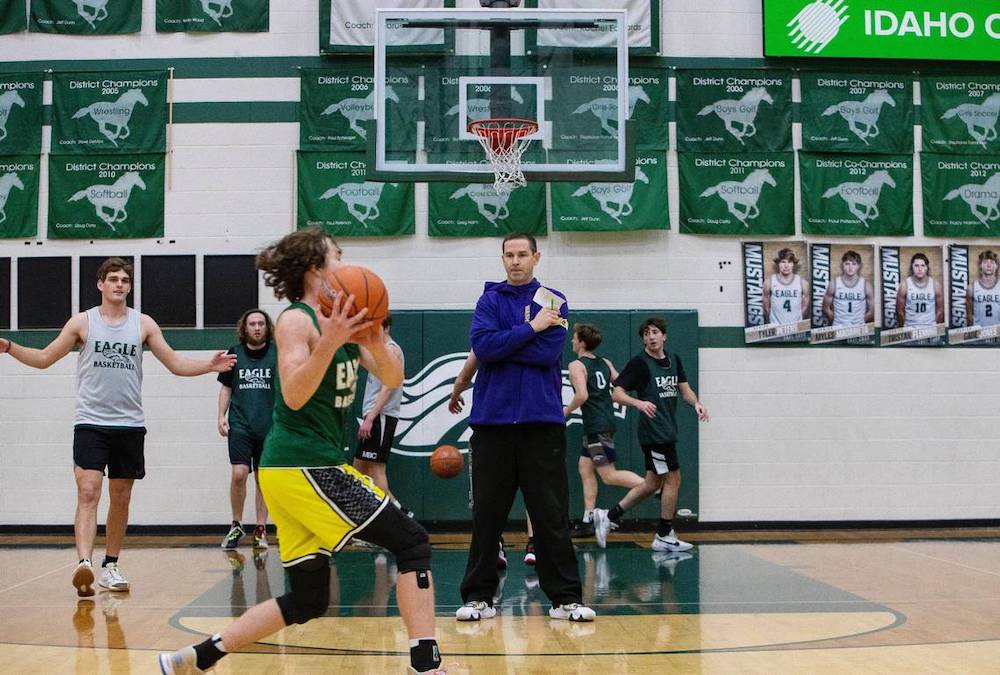‘Silent killer’ loomed in Idaho coach’s heart. Flood of online support led him to a remedy
Published at | Updated at
EAGLE (Idaho Statesman) — Cody Pickett stalked the gym floor at Eagle High on Friday, working his way between stations as the Mustangs closed practice with free throws.
He cracked jokes. He told stories. He ribbed those missing their shots.
Pickett’s infectious energy filled Eagle’s gym. And the Mustangs responded, gravitating toward their coach and clogging the free-throw lines.
The light-hearted moment stood in contrast to the trying past month for the Eagle High boys basketball coach. Doctors discovered a 70% blockage in one of Pickett’s major arteries, recommending open-heart surgery to clear what’s known as a “silent killer.”
But his wife’s viral Facebook post, an outpouring of support and Pickett’s days as a record-setting quarterback at the University of Washington led to a different solution — one that has him back on the court with his Mustangs far sooner than anyone expected.
“My family and I are so, so, so blessed,” Pickett stressed from his coach’s office Friday. “We are loved. I got emotional one night talking about it and starting crying, saying, ‘Gosh, what did I do to deserve all this love and attention?’”

NEW FAMILY HISTORY OF HEART DISEASE
Pickett showed no symptoms of heart troubles. His age, 41, left no reason to worry. And the former NFL and CFL quarterback remains in outstanding shape.
But the sudden death of his uncle, Jay Pickett, changed the equation.
A similar blockage led to a massive heart attack that killed the actor known for his roles on daytime dramas “General Hospital,” “Days of Our Lives” and “Port Charles” on July 30. He was 60.
Jay Pickett also had no warning signs. He simply slumped over while waiting to film a scene in his new Western movie. He never even fell off his horse, Pickett said.
The death led the rest of the family to seek medical tests. Pickett’s showed early signs of trouble. Then came the bombshell — a 70% blockage in his left anterior descending artery, which supplies blood to large portions of the heart.
“They call it the widowmaker because, obviously, if it plugs up,” Pickett says, pausing to clap his hands, “you’re just like my uncle.
“… This is something that people don’t even talk about. It’s the No. 1 killer because people like myself and my uncle, we’re in good shape, you think you’re fine, and it’s just game over.”
He received the news Dec. 21 on the way to Eagle’s game against Owyhee. Doctors advised him to take it easy. But the Mustangs didn’t oblige, taking the 5A SIC preseason favorite to four overtimes before emerging with a victory that vaulted Eagle to No. 2 in the state media poll.
Pickett returned Dec. 30 for an angiogram. He and his wife, Carleigh, prepared for the possibility doctors would insert a stent to open the blockage. But its hard-to-reach location prevented doctors from reaching it without open-heart surgery, they informed Carleigh.
Doctors woke Pickett and informed him they were searching for an ambulance to take him to Boise and a surgeon to perform immediate surgery. But they couldn’t find anyone available, so Pickett returned to Eagle to catch the end of the Mustangs’ win over Post Falls that night.
He stood in the top corner of the gym, gathering his thoughts before breaking the news to his team.
“The emotions, the tears, the …,” the father of three said before collecting himself. “Then you’re trying to figure out, ‘OK, you’re 41.’ My biggest fear is not being here for my kids. My wife is wonderful. She’ll be OK. But my kids?
“It was very, very emotional.”
A VIRAL FACEBOOK PLEA
Carleigh detailed Pickett’s medical scare Dec. 31 on her Facebook page, writing “I just keep praying, praying, praying that maybe they were wrong … maybe something was overlooked … maybe there is something ELSE that can be done.”
The post quickly went viral. Treasure Valley opponents posted well wishes. Washington fan sites shared Carleigh’s post. More than 500 comments flooded in.
Carleigh responded to the sea of messages on New Year’s Day before one comment caught her eye. Channing Wyles, a Washington punter from 1986 to ’91, recommended Pickett seek a second opinion. And he knew just the man: Dr. William Lombardi, who specializes in hard-to-place stents and is the director of Complex Coronary Artery Disease Therapies at, fittingly, the University of Washington Heart Institute.
Pickett hesitated to reach out to Wyles, a man he’d never met, on the holiday. But he took the leap, and Wyles told him he’d already briefed Lombardi and to expect a call later that day.
“He said, ‘Hey, you can go get open-heart surgery. It’s a free country,’” Pickett recalled Lombardi saying. “‘But what I do is very complex, and I feel very confident. You come up here and I’ll be able to help you.’”

AVOIDING OPEN-HEART SURGERY
Pickett arrived in Seattle on Monday to a warm welcome. The entire Washington football coaching staff signed a card for the former Husky great, and the team put together a gift basket that included a framed picture from Pickett’s playing days.
The entire surgery took only an hour, and Pickett remained awake throughout. A white sheet shielded his view while surgeons entered through a vein in his right wrist and navigated to his heart to install the stent.
“It was pretty intense for however long it took them to do it,” Pickett said. “Dr. Lombardi directed traffic, and he said, ‘Hey, you’re good. We’ll see you outside.’
“It was a crazy, wild experience. When I came out, I could have sat there for days because I was just so relieved.”
But Pickett had one burning question: Could he return to coaching?
Lombardi responded: “Yes, as long as you win.”
Pickett informed the Mustangs of the doctor’s orders, and they delivered a 27-point victory at Boise that night while their coach watched on his phone from a hospital bed.
He left the hospital at 9 p.m., met Wyles for the first time the next morning and returned home Tuesday night in time for his fourth- and fifth-grade team’s practice. He rejoined the Mustangs on Wednesday and coached his first game Saturday, a 61-31 win over Centennial to keep pace atop the 5A SIC standings.
PICKETT RETURNS HOME TO IDAHO
Pickett remains in search of his new normal. Doctors put him on blood thinners for a year to ensure a clot doesn’t form at the site of the stent. He remains on statins to reduce his cholesterol. And he’s switched to a plant-based diet, which comes with a heavy dose of irony for the former cowboy.
His father, Dee Pickett, is in the Pro Rodeo Hall of Fame. And Pickett learned to rope as soon as he could walk, making the national high school rodeo finals multiple times before a college and professional football career.
“I grew up on Chicken Dinner Road,” Pickett said with a laugh. “My grandpa was a cattle buyer. So if there’s a steak in front of me, I’m probably going to eat it. But you can’t base your diet around that.”
He returned to the gym for a light workout Friday for the first time. He hasn’t laced it up with the Mustangs yet, showing them first-hand what he wants by out rebounding the teenagers and punishing any mistakes with a dunk. But Eagle senior co-captain Donovan Jones said Pickett hasn’t changed at all.
“He was right back to full-energy Cody,” Jones said. “… He is still his same self.”
So good to be back with my guys today! Thank you to Dr. Lombardi and everyone at the UW Medical Center for getting me taken care of! As always Go Dawgs!
I also can't thank everyone enough for all the love and support my family and I have received! We are feeling so blessed! ? pic.twitter.com/6wsJIPRlLE— Cody Pickett (@idahocp3) January 13, 2022
AN ADVOCATE FOR EARLY DETECTION
Pickett still struggles to wrap his mind around the volume of support he received. His team created shirts bearing his likeness. Students from rival Rocky Mountain wore red (for his heart) when they took on the Mustangs. And the social media messages continue to flood in.
Only now can he read those notes without breaking down.
But all that support came as no surprise to fellow Eagle senior co-captain Gage Jones.
“Cody is a special guy,” Gage Jones said. “He has great relationships with everybody. He touches everybody wherever he goes. That’s why the community was so involved.”
Pickett said he cringed when his wife first took to Facebook. He rarely shares much on social media, let alone personal medical information. But less than 24 hours after her first post, they found the needle-in-a-haystack connection that changed everything.
“I’m just so blessed and thankful that I got so much love and it was shared,” Pickett said. “And Channing Wyles, without him putting me in touch with Dr. Lombardi, I wouldn’t be coaching my team right now.”
Pickett remains the same private person who regularly tried to duck interviews while setting records at Washington. He hesitated at first to share his story with the Idaho Statesman. But after witnessing the power of stories himself, he knows they can save lives.
He preaches the key of early detection, the value of second opinions and even the advantages of social media.
“I’ve had four or five people that have reached out to me and said, ‘Hey, Cody. We loved your story, and we’re going to get checked,’” Picket said.
“This sounds corny. But gosh, it’s real. What if somebody gets their life saved because of this?”



